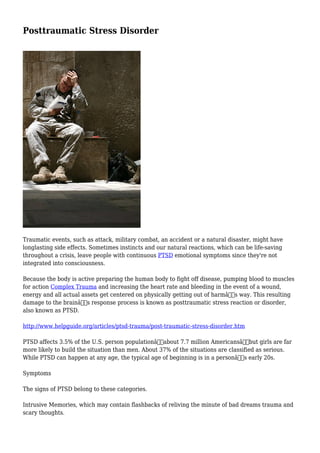
Posttraumatic Stress Disorder
- 1. Posttraumatic Stress Disorder Traumatic events, such as attack, military combat, an accident or a natural disaster, might have longlasting side effects. Sometimes instincts and our natural reactions, which can be life-saving throughout a crisis, leave people with continuous PTSD emotional symptoms since they're not integrated into consciousness. Because the body is active preparing the human body to fight off disease, pumping blood to muscles for action Complex Trauma and increasing the heart rate and bleeding in the event of a wound, energy and all actual assets get centered on physically getting out of harm’s way. This resulting damage to the brain’s response process is known as posttraumatic stress reaction or disorder, also known as PTSD. http://www.helpguide.org/articles/ptsd-trauma/post-traumatic-stress-disorder.htm PTSD affects 3.5% of the U.S. person population—about 7.7 million Americans—but girls are far more likely to build the situation than men. About 37% of the situations are classified as serious. While PTSD can happen at any age, the typical age of beginning is in a person’s early 20s. Symptoms The signs of PTSD belong to these categories. Intrusive Memories, which may contain flashbacks of reliving the minute of bad dreams trauma and scary thoughts.
- 2. Avoidance, which can include steering clear of objects or certain sites that are reminders of the traumatic event. A person might feel anxious, numb, guilty or frustrated or having trouble recalling the traumatic event. Dissociation, which can include out-of-body activities or feeling that the world is "not real" (derealization). Hypervigilance, that may include being surprised very easily, feeling tight, sleep problems or reactions of anger. During the last 5 years, research on 1–6 year olds found that small children can form PTSD, and the symptoms are very distinct from those of people. These studies also noticed a growth in PTSD diagnoses in young children by over 8 times when utilizing the newer criteria. Symptoms in small children can include: Operating out scary events during playtime Forgetting being unable to talk Being clingy with adults Severe temper tantrums, together with aggressive behavior Diagnosis http://www.nami.org/Template.cfm?Section=Posttraumatic_Stress_Disorder Indicators of PTSD typically start within 3 months after a traumatic event, but sometimes emerge years afterward. Indicators should last higher than a to be considered PTSD. PTSD is often associated with despair, drug abuse or another panic disorder. People can identify symptoms in various ways. How a person describes symptoms typically depends upon the cultural contact she is looking through. Although in several Western cultures, people additionally check with physical pain in Western cultures, people typically talk ptsd about their emotions or emotions. African Americans and Latinos tend to be more likely to be misdiagnosed, so that they must look for a medical care professional who shares their expectations for treatment and understands their history. Since small children have minimal verbal expression and promising abstract cognitive, research indicates that diagnostic criteria must be much vulnerable to find PTSD in preschool children and behaviorally anchored. Read more about the preschool subtype in the National Center for PTSD. Treatment PTSD handled and is treated in several ways. Medicines, including antidepressants, antipsychotic medications and mood stabilizers. Psychotherapy, including cognitive behavioural therapy or group therapy. Self-management techniques, such as "self-soothing". Several treatment strategies, including
- 3. mindfulness, are helpful to floor an individual and deliver her back to reality following a dissociative episode or a flashback. Service animals, especially dogs, might help soothe some of the symptoms of PTSD. It can be treated successfully, although PTSD can not be relieved. Read more on our treatment page. Related Conditions Someone with PTSD may have added conditions, in addition to feelings of or attempts at suicide: Anxiety disorders, including OCD and Generalized Anxiety Disorder Borderline Personality Disorder Depression Substance abuse These different illnesses causes it to be tough to deal with PTSD. For instance, medications used to deal with depression or OCD may worsen symptoms of PTSD, and could actually trigger them. These related diseases almost always improve. And successful treatment of depression, additional anxiety or drug abuse typically increases the signs of PTSD.